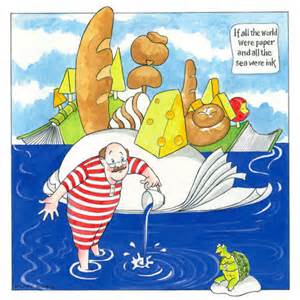
…what would we do for drink!”
I wonder if you recognize the first lines of this poem written by an anonymous author
“If all the world were paper
And all the sea were ink,
If all the trees were bread and cheese
What would we do for drink?
The first (of the two) May Spring Bank holiday is here in the U.K., and having waited for this official day off work (not for all, but most of us) we wonder, “What is the weather going to be like?” The statistics point to the fact it is quite likely to rain at some point in the day. Oh! how that ‘wet stuff’ spoils our plans and picnics!
To be honest, I didn’t actually start off to write on any particular theme, I was actually (and I am still) pondering, as I read my Bible, about the Transfiguration of Jesus in Luke 17, but do bear with me.
My thoughts meandered and I have found, having read that Moses and Elijah were discussing Jesus’ departure, which my curiosity about this whole scenario keeps on growing. There is a footnote at the bottom of my bible’s page in reference to this particular word, and I see that it also means exodus.
Having just observed my Jewish neighbourhood celebrating Pesach, or Passover, this past week, I turned to the Book of Exodus and begin to compare the two paths of the one story; of Moses, Elijah and Jesus. These are bound together as Jesus himself declared that he came to fulfill both the Law and the Prophets. Moses represents the Law and Elijah presents the Prophets (Matthew 5:17), and here they are all standing together! How fascinating.
Passover is a high feast and festival perpetually remembered throughout all generations of Jewish people, of their past historical exodus, deliverance, liberation, out of slavery led by Moses. Israel is chosen as God’s son and saved by the blood of a lamb spread over their doorposts from the ‘death of the firstborn’ plague in Egypt.
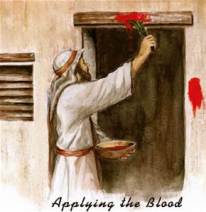
Death passed over them and they were saved. Therefore, Passover is celebrated with the sacrifice of a pure and unblemished lamb and by eating only unleavened bread in remembrance of how fast they fled slavery in Egypt. As they were led out of slavery Moses parted the Red Sea; he led all Israel towards the promise from the LORD of having their own Land. This sets the scene from one side of this pathway. Along the way, the Israelite peoples grumbled (Ex 17) and wanted water.
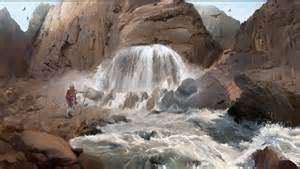
The water came, as Moses struck the rock, as God had said it would (Ex 17:6)
“You shall strike the rock
and water shall come out of it,
and the people will drink.”
If you cast your mind back to the point where I was reading about the Transfiguration of Jesus, with Moses and Elijah both present, we again pick up the thread of the other side of the path. There are mysterious and mystical events which lay hidden on the pages, like diamonds hidden in the darkness. Firstly, we can learn from the biblical narrative (Deut 32:50; 34:5) that Moses never made it to the Land promised Israel; he dies before as God said he would. Mysteriously the text explains that God buried Moses. Stranger still, if we skip ahead to 2 Kings 2:11, Elijah was taken up to heaven in a whirlwind. His cloak was dropped and Elisha received it, and the double portion he requested. With the cloak, Elisha, like Moses, parted water!
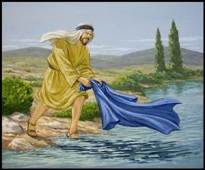
As the pathways merging the Bible tells us that Jesus is The Rock, and here we see ahead to his exodus, towards Jerusalem and the cross of crucifixion; his death and resurrection. When Jesus was nailed and hung upon that cross for our salvation, deliverance, liberation and freedom from slavery to sin, his side was pierced, the Rock once more poured forth water, and also blood. He was the Lamb of God (Jn 1:29) slain (Rev 13:8). Jesus was struck as was the rock in the wilderness.
These two paths like streams flow and continually mix together. Here we see that there is hidden within the Old Testament a shadow of Christ (or Messiah) as the New Testament eventually reveals. As Israel was fed manna in the wilderness, Jesus now declares, “I am the Bread of Life!” (Jn 6:41) This bread was broken for our deliverance, and as the blood of the lamb was to cover the doorframes of the Israelites, we are covered by the precious blood of Jesus which atones for our sins.
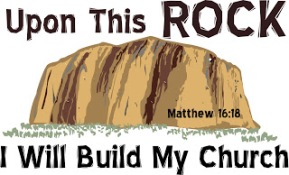
Jesus renamed his disciple and Apostle Peter, Cephas or rock (Jn 1:42) and he declared over him, just prior to taking him up the mountain (with James and John) to witness his Transfiguration, saying to him that “You are Peter, and on this rock I will build my church, and the gates of hell shall not prevail against it” (Matt 16:18). This is where Christian’s fit into the river of life offered, where they too are chosen and adopted as sons, welcomed into the story God has always intended to tell. For Christian’s they are welcomed in, to partake of the Eucharist which is as Stibbe describes as “a liturgy of liberation.”[1] He writes of how we are adopted and included, to know God as our loving heavenly Father.
God has always intended that these two paths; these two streams would join and flow as one. This very water of life, as Jesus was mysteriously, and mystically, ‘taken up’ into heaven following his resurrection from the dead, promised the release of the Holy Spirit, that He would be poured out for our spiritual thirst. There is no life without water. Jesus promised streams of living water would flow from him.
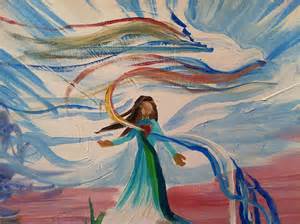
From the very beginning of God’s story (Gen 1:2) to the end (Revelation 22:1) not only was living water promised, but also that there would be a new heaven and earth, a new Jerusalem, new life and that God would dwell with all His people forever and give them eternal life. In fact, creation re-created with all God’s children together again.
We are birthed by maternal waters, and born again by the Father’s Holy Spirit who gives life with spiritual water; we are cleansed in it and surrounded by it. In Christian baptism, it signifies God’s internal grace at work in our lives. We imbibe it, we thirst for it; it slakes our deepest known cravings. It drenches and soaks the needy both physical and spiritual.
Water: something so familiar to us all and also something which we cannot live without; literally, or spiritually. God speaks revealing through his creation to us from the imagery of water. Water is a metaphor, allegory, in the writer’s toolbox. For the sailor and fisherman, it is his livelihood. It is paramount in all our work, rest, and play, for all ages; in all our leisure and hobbies and games. We can swim and relax and float in it. It costs yet it is free, we pay a water bill and we can collect water for nothing from the garden. It cost God everything and yet we receive this freely from his gracious hand. Water is humanities necessity, for we cannot go too long without any to drink before seriously harming our wellbeing. Eventually, it will appear as an illusion in our mind, like a mirage in the desert for the desperate or confused. Without a fresh supply of clean water, we would die for it regulates our body temperature. and keeps us hydrated.
Water is all around us, in us and washes over us to our delight to feel clean and refreshed. Water forms the misty dew of the early morning; it falls to create puddles, streams, lakes, rivers, seas and vast oceans. It is pulled up from the earth to make cumulus high clouds which eventually drop it down again. The great waters separate our world’s continents and lands, tribes and peoples, cultures and languages.
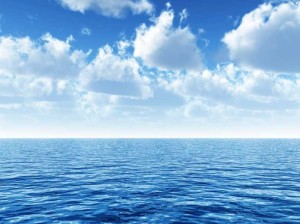
Sadly humanity continues in poisoning its water supplies, it ravages the earth and millions of people still in the 21st century have no access to clean drinking water. Water gives life to us and yet paradoxically can cause our death. It is dangerous, can drown the unwary and carries diseases in poor countries where clean water cannot be found. This madness threatens all life and it is a wake-up call to everyone.
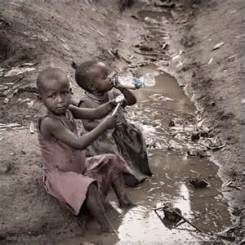
Compassion is needed for the poorest
Jesus spoke saying, “and even if you give
a cup of cold water to one of these little ones
you will surely be rewarded.”
Scientists are ever searching for it on the barrenness of another solar system’s planet like Mars in the hope of finding ‘life’. Once spilt on the dry Earth it is gone, it can never be recovered. It goes down to the seeds and sprouts life in another way. It is a simple chemical compound of hydrogen and oxygen that gives and sustains life in all its varieties. It is so familiar to us that we do not always see its deepest significance.
Water naturally comes in three states of solid, liquid and gas; it is freezing cold, lukewarm tepid or boiling hot. It is one substance and yet three at the same time; God is described by theologians as Trinity; as one God and at the same time three persons. This is a physical revelation and representation of a wonderful internal spiritual reality.
So as you can see there is no excuse for not being thankful to God for it, using it well and that all may have access to clean supplies. There can be no excuse for causing harm to another due to our greed and selfish use of it. It is a vital commodity that ensures our human survival; it is profoundly reflective of our human need before God to have both physical and spiritual water to drink. Our beautiful world is deeply saturated with its blue hues, with its wonderful mysteries of sea creatures and is an enormous reserve. However, consider that if this ever were not so, the poem I began with would, if true, become our worst nightmare! “What would we do for drink?”
[1] Stibbe, M, ‘From Orphans to Heirs’, 2005.
